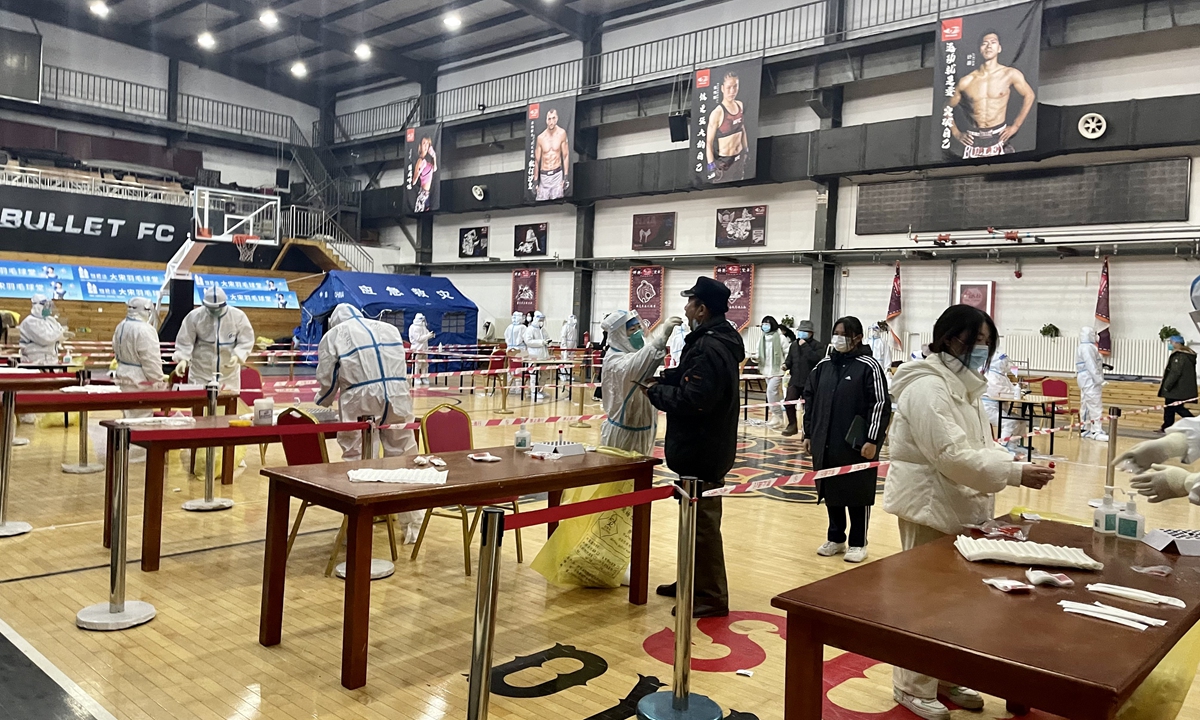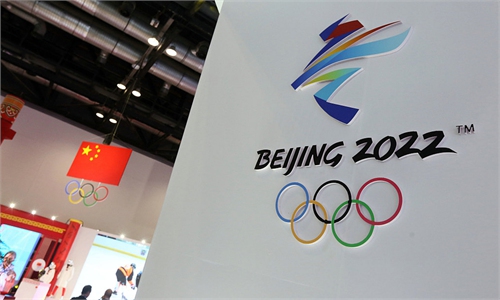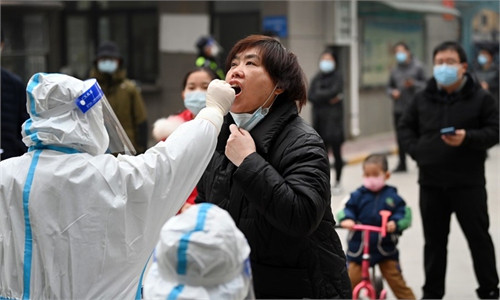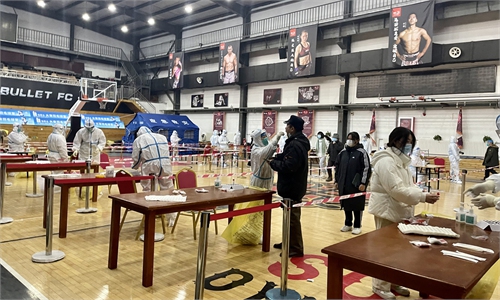Beijing races against virus to cut off transmission after first local Omicron case reported
Capital on high vigilance to extinguish flare up with Winter Olympics three weeks away

Beijing Photo: CFP
Beijing, China's capital city, has beefed up COVID-19 prevention measures after the more contagious variant of the virus, Omicron, has appeared in the city, which is preparing to host the Winter Olympics in just three weeks.
The patient, who neither had contact with confirmed cases nor left the city in the last 14 days, has put the capital on high vigilance. Roughly 13,000 people and all places the patient went to lately have been tested in the last 48 hours, and officials have called for epidemiological investigations to be sped up in order to cut off virus transmission.
Epidemiologists warned Beijing may be subject to more stringent measures such as citywide testing and traffic restrictions if more sporadic flare-ups within the city are reported. The city is also facing another infection risk as an influx of Winter Olympics participants will be welcomed during the coming week, which means sticking to a dynamic zero-COVID policy is more important than ever during the event.
As of Sunday noon, a total of 13,000 people were tested in Haidian district, where the patient lives and works. Places the patient went to within the last 14 days, including Beijing's luxury shopping mall SKP, also completed disinfection procedures, nucleic testing of their employees and reported examinations of their samples had all returned negative results.
Beijing's swift epidemic response to the city's first local Omicron case has been widely hailed. Within ten hours after the report of the preliminary test, Beijing health authorities conducted nucleic acid tests on all related environments, related people and close contacts in places where the patient lives and works, and a press conference on the epidemic was also held on Saturday night.
Xu Hejian, a spokesperson for the Beijing municipal government, said on Saturday night that with Beijing entering the Winter Olympics period, the new case reported rings alarm bells for the city's COVID-19 prevention work.
Beijing issued a notice on Sunday that from January 22 to the end of March, which is weeks after the end of the Winter Paralympic Games, arrivals to the capital are required to do a nucleic test within 72 hours of arriving in the city, in addition to previous requirement of a valid test within 48 hours before arrival.
Many primary and middle schools in Haidian and Xicheng districts told their students to study online from Monday to Friday, the last week before the winter vacation.
Beijing is also temporarily closing certain scenic spots and temples to public since Sunday including Baiyunguan and Yonghegong Lama Temple, and religious activities in these venues are suspended, given the "overall change of Beijing's COVID-19 prevention situation."
Juyongguan section of the Great Wall would be closed to public from Wednesday to March 12.
After the case was discovered, the Beijing Center for Disease Prevention and Control on Sunday reiterated that protective facial masks should be worn in public venues, as they remain "the most effective way to fend off the virus", even with the Omicron variant. The rule applies to all, including those who are fully vaccinated and also to those who have received a booster shot, the local CDC said.
Cai Qi, secretary of the Communist Party of China Beijing Municipal Committee and president of the Beijing 2022 Organizing Committee, said at a Saturday meeting that COVID-19 prevention is the most important task to ensure safe Olympics, a safe city and safeguard people's health, and that closed-loop management is the key, and the integrated work mechanism for security, transportation and epidemic prevention must be improved.
Wang Guangfa, a respiratory expert at Peking University First Hospital, said the current situation in Beijing is difficult to judge, as the origin of the infection remains unknown. "It is very possible that new cases will emerge if the cause is unclear," said Wang.
The doctor warned that if Beijing reports more cases around the city in the following days, the capital may opt for a wider scope of testing and restrict traffic in certain areas, and also limit movements within certain areas in the city.
Lu Hongzhou, head of the Third People's Hospital of Shenzhen and member of the expert committee of Shenzhen epidemic prevention and control center, told the Global Times that patients with the Omicron variant tend to have milder symptoms, making it difficult to detect, adding that this made COVID-19 prevention work more difficult.
Zhang Wenhong, a renowned Chinese infectious disease expert in Shanghai, also warned that the Omicron variant brings less serious illness but its virulence should not be overlooked, and that China will continue to face a high risk of imported cases in the next half-year, but this cold winter may probably be the last of the pandemic, following increasing herd immunity and the emergence of new COVID-19 drugs.
Olympic period
Media reported that a total of 12 flights with over 200 Olympics related personnel will arrive in Beijing from overseas this weekend, and the number of arrivals is estimated to peak on Friday. This is the largest and most intensive arrival into China from outside the country since the pandemic began.
Zhang Liang, head of the arrival and departure center of the Beijing 2022 Organizing Committee, told the media recently that "We need to conduct detailed arrangements in terms of flight arrangement, health declaration, COVID-19 tests, accreditation activation and customs clearance of those Olympic-related personnel at the airport, transportation and logistics after they leave the airport, and their security check and check-in in accommodation."
He also said that the organizer has made the customs clearance process more efficient so that arrivals spend less time at the airport, which will also help to reduce the risk of infection.
Seven hotels in Haidian district, including the Shangri-La, which will accommodate participants for the 2022 Beijing Winter Olympics, is well prepared for the event. The Shangri-La said it will impose a small-scale closed-loop management starting from Monday, with daily total reserved rooms reaching 252. A larger scale closed-loop management will be rolled out from Friday covering some 400 rooms.
Wang said the single case in Beijing will not impact the Winter Olympics, and that there is no need to overreact. However, the epidemiologist warned that the influx of participants from outside China may trigger infections within the closed-loop bubble.
Wang also noted that Tokyo witnessed a surge of infections related to the Summer Olympics after the event ended, and to prevent large-scale infections, that is why sticking to the dynamic zero-COVID policy is more important for Beijing, and for China now, he said.
However, the strict COVID policy has also drawn fierce criticism from some Western countries and media ahead of the event. CNN reported during the weekend that from January 19 and continuing for at least two weeks, all flights from the US to China have either been canceled or are likely to be suspended because of Chinese aviation regulations.
The Chinese embassy in the US issued a warning on Saturday, citing surging infection numbers in the country, and asked travelers to consider the urgency and necessity of their journeys, along with the economic losses brought by suspended flights due to the "circuit breaker" policy on inbound COVID-19 cases.
Experts said that the US has its own unbridled outbreak to deal with, and its intention in picking this old fight is to intensify its smear of China's COVID-19 prevention policy ahead of the Beijing 2022 Olympic Games.
However, this "petty move," as well as other tricks by the US, cannot hamper the influence of the Beijing Winter Olympics, nor can it hold China back from successfully hosting this event, they said.





